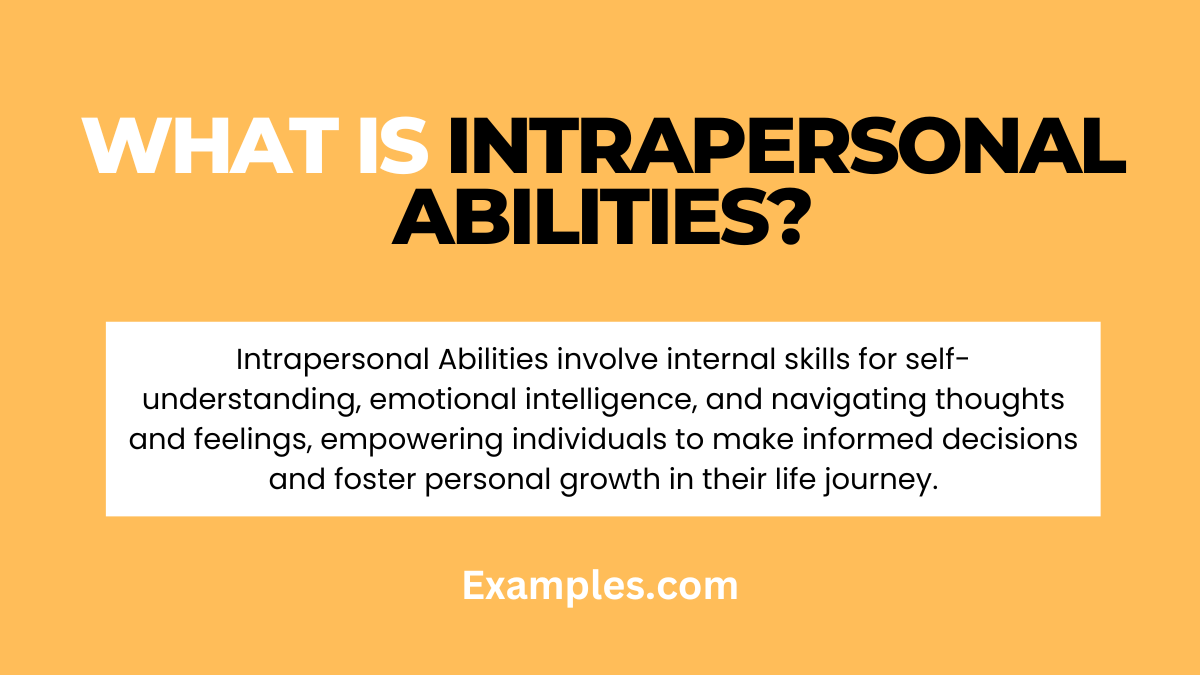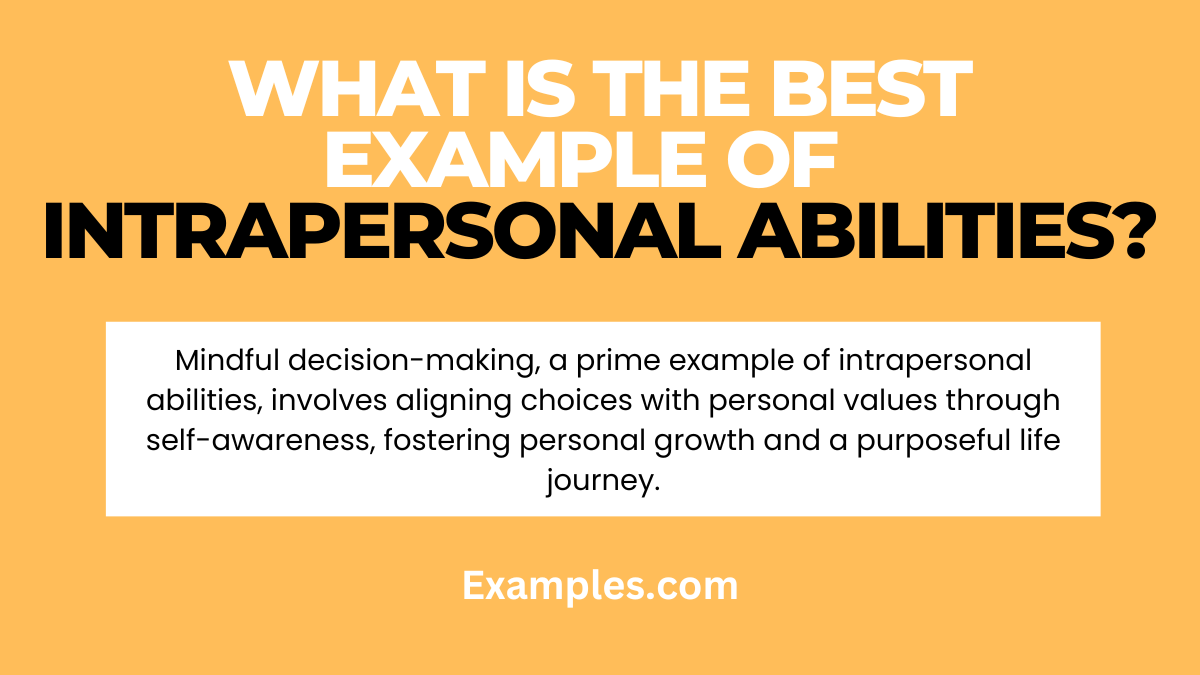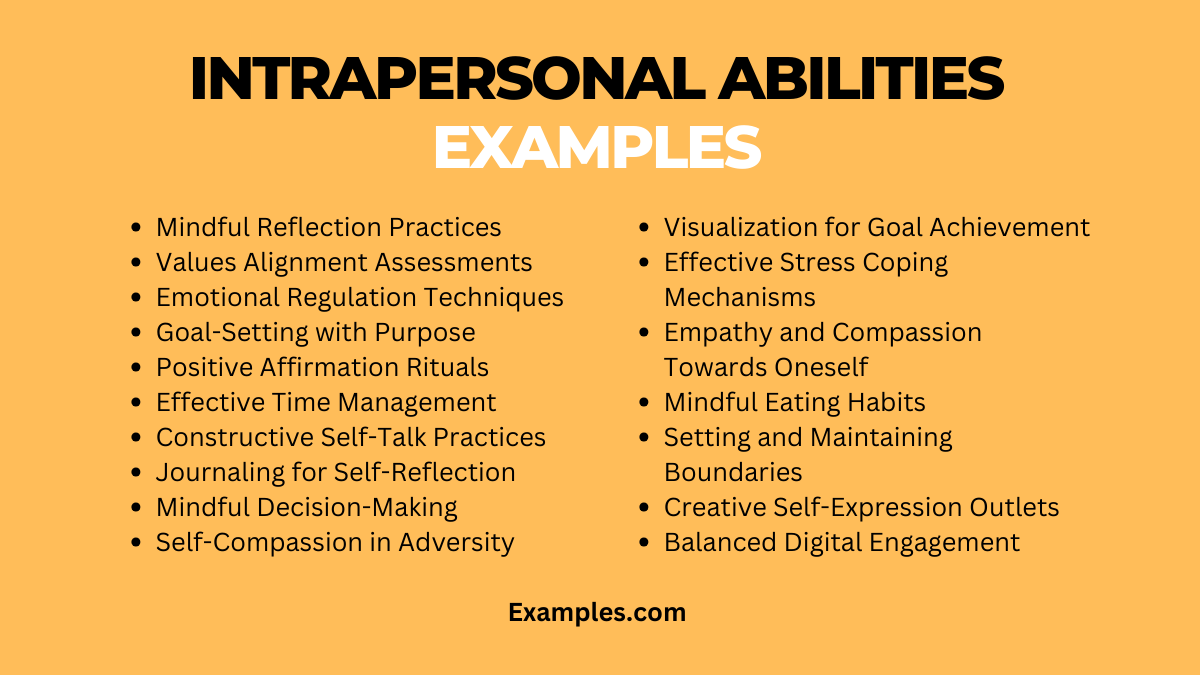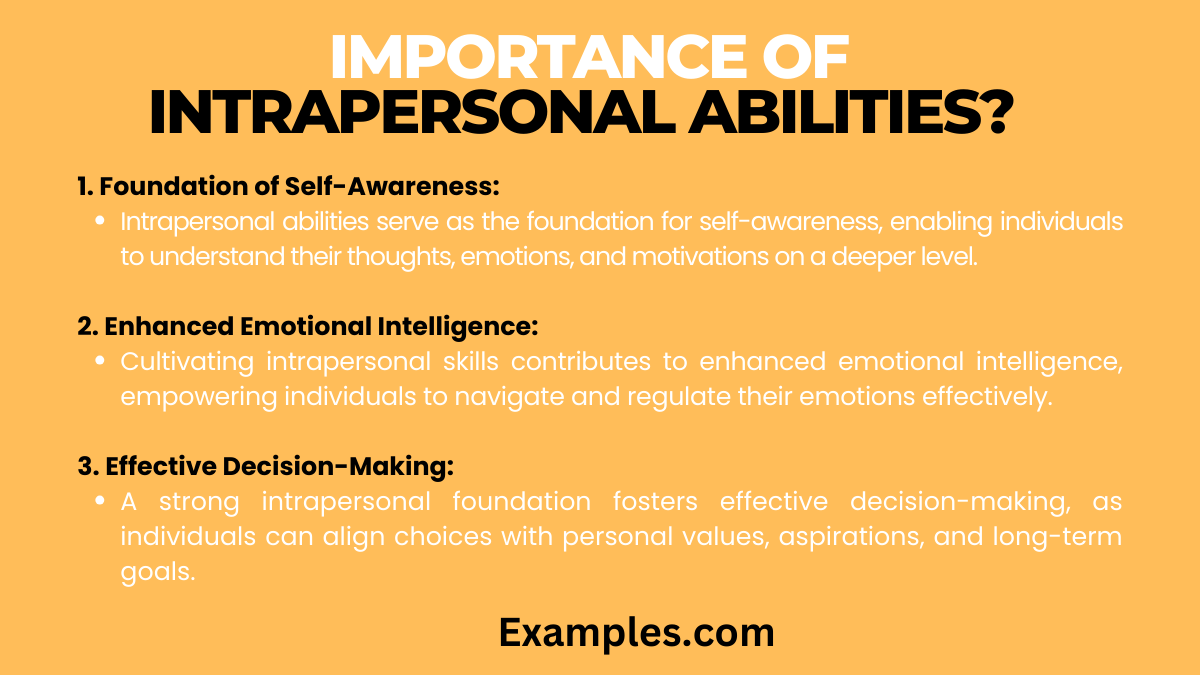Intrapersonal Abilities
Embark on a transformative journey with our comprehensive guide to Intrapersonal Abilities. Delve into unique examples and practical tips that go beyond traditional self-help. This guide goes deep, emphasizing the importance of effective self-communication examples within intrapersonal realms. Explore the art of nurturing personal strengths, fostering emotional intelligence, and unleashing the full potential of your intrapersonal abilities for a more resilient and self-aware existence. This is your roadmap to mastering the intricacies of self-connection and empowerment.
What is Intrapersonal Abilities?

Intrapersonal Abilities refer to an individual’s internal skills and capacities to understand, manage, and connect with oneself effectively. This involves self-awareness, emotional intelligence, and the capacity to navigate personal thoughts, feelings, and motivations. Individuals with strong intrapersonal abilities can cultivate a deep understanding of their strengths, weaknesses, and personal dynamics, enabling them to make informed decisions, foster personal growth, and engage in effective self-communication for a more fulfilling life journey.
What is the Best Example of Intrapersonal Abilities?

In the realm of intrapersonal abilities, a standout example is mindful decision-making. This involves an individual’s capacity to approach choices with self-awareness, aligning decisions with personal values, and considering the long-term impact. Through reflective introspection and understanding of one’s motivations, strengths, and limitations, this example exemplifies how intrapersonal abilities empower individuals to make informed, values-driven decisions. The practice of mindful decision-making fosters personal growth, emotional intelligence, and a more purposeful and fulfilling life journey.
25 Intrapersonal Abilities Examples

Explore 25 diverse examples of Intrapersonal Abilities, guiding individuals to enhance self-awareness, emotional intelligence, and effective self-communication. This comprehensive list provides insights into cultivating strong internal connections for personal growth.
- Mindful Reflection Practices: Engage in daily mindful reflection, fostering self-awareness by contemplating thoughts, feelings, and experiences.
- Values Alignment Assessments: Conduct values alignment assessments to understand core beliefs, guiding decisions and actions in alignment with personal principles.
- Emotional Regulation Techniques: Practice emotional regulation techniques, such as deep breathing or meditation, for managing and understanding emotions effectively.
- Goal-Setting with Purpose: Set meaningful goals aligned with personal aspirations, fostering motivation and a sense of purpose in daily endeavors.
- Positive Affirmation Rituals: Establish positive affirmation rituals, reinforcing self-worth and cultivating a positive mindset.
- Effective Time Management: Implement effective time management strategies to balance priorities and reduce stress, enhancing overall well-being.
- Constructive Self-Talk Practices: Develop constructive self-talk habits, promoting a positive inner dialogue for improved self-esteem.
- Journaling for Self-Reflection: Maintain a journal for self-reflection, capturing thoughts and emotions to deepen understanding of personal experiences.
- Mindful Decision-Making: Approach decision-making mindfully, considering personal values and long-term impact for informed choices.
- Self-Compassion in Adversity: Cultivate self-compassion during adversity, acknowledging challenges with kindness and resilience.
- Visualization for Goal Achievement: Use visualization techniques to picture and manifest goals, enhancing motivation and focus.
- Effective Stress Coping Mechanisms: Develop effective stress coping mechanisms, such as exercise or creative activities, for emotional well-being.
- Empathy and Compassion Towards Oneself: Practice empathy and compassion towards oneself, fostering a positive relationship with personal experiences.
- Mindful Eating Habits: Cultivate mindful eating habits, promoting a healthy relationship with food and one’s body.
- Setting and Maintaining Boundaries: Set and communicate personal boundaries to maintain balance and foster healthy relationships.
- Creative Self-Expression Outlets: Engage in creative self-expression outlets, such as art or writing, to communicate inner thoughts and emotions.
- Balanced Digital Engagement: Establish balanced digital engagement practices to maintain a healthy relationship with technology.
- Regular Physical Activity for Well-Being: Prioritize regular physical activity for overall well-being and the release of endorphins.
- Resilience in Face of Setbacks: Cultivate resilience in the face of setbacks, viewing challenges as opportunities for growth.
- Effective Problem-Solving Skills: Develop effective problem-solving skills, approaching challenges with a solution-oriented mindset.
- Regular Mindfulness Meditation: Incorporate regular mindfulness meditation sessions into the routine for enhanced focus and relaxation.
- Authenticity in Self-Expression: Embrace authenticity in self-expression, allowing genuine feelings and opinions to be communicated.
- Gratitude Practices for Positivity: Adopt gratitude practices, expressing appreciation for life’s positive aspects to promote a positive outlook.
- Setting Realistic Expectations: Set realistic expectations for oneself, fostering a healthy and achievable pursuit of personal goals.
- Seeking Support When Needed: Acknowledge the importance of seeking support when needed, promoting mental and emotional well-being.
Intrapersonal Abilities for Students Examples
Explore Intrapersonal Abilities tailored for students, fostering self-awareness, emotional intelligence, and effective self-communication. This guide empowers students to navigate challenges, make informed decisions, and promote personal growth throughout their educational journey.
- Goal-Setting Workshops for Academic Success: Engage students in goal-setting workshops to align academic aspirations with personal values for sustained motivation.
- Mindful Study Habits for Focus: Encourage mindful study habits, promoting concentration and emotional regulation for effective learning experiences.
- Reflection on Personal Achievements: Prompt regular reflection on personal achievements, instilling a sense of accomplishment and self-recognition.
- Positive Affirmation Rituals for Confidence: Introduce positive affirmation rituals to enhance students’ self-confidence and self-worth in academic pursuits.
- Peer Collaboration for Self-Reflection: Facilitate peer collaboration programs, encouraging self-reflection and growth through constructive feedback.
Intrapersonal Abilities for Teachers Examples
Explore Intrapersonal Abilities tailored for teachers, promoting self-awareness, emotional intelligence, and effective self-communication. This guide empowers educators to navigate the challenges of teaching, promote student well-being, and foster a positive learning environment.
- Mindful Lesson Planning for Emotional Well-Being: Incorporate mindfulness into lesson planning, enhancing teacher well-being and emotional regulation in the classroom.
- Reflective Journaling for Professional Growth: Encourage reflective journaling among teachers, fostering continuous professional development and self-awareness.
- Emotional Regulation Techniques for Classroom Management: Equip teachers with emotional regulation techniques to manage stress and promote a positive classroom environment.
- Values-Aligned Teaching Practices: Integrate values-aligned teaching practices, allowing educators to connect with students on a deeper level and promote shared values.
- Peer Support Groups for Shared Experiences: Establish peer support groups for teachers to share experiences and insights, promoting a sense of community and mutual understanding.
How did intrapersonal skills and abilities apply to our everyday lives?
Intrapersonal skills, the internal capacities that govern self-awareness, emotional intelligence, and effective self-communication, play a pivotal role in shaping our daily experiences. This guide delves into the multifaceted applications of intrapersonal abilities, exploring how they influence decision-making, relationships, personal growth, and overall well-being in our everyday lives.
1. Enhancing Self-Awareness:
- Intrapersonal skills heighten self-awareness, allowing individuals to understand their emotions, motivations, and reactions, leading to informed decision-making.
2. Influencing Decision-Making:
- By applying intrapersonal abilities, individuals can make decisions aligned with personal values, fostering a sense of purpose and satisfaction in daily choices.
3. Navigating Interpersonal Relationships:
- Intrapersonal skills contribute to healthier interpersonal relationships, as individuals who understand themselves are better equipped to relate empathetically to others.
4. Managing Stress and Challenges:
- The application of intrapersonal skills aids in stress management, enabling individuals to navigate challenges with resilience and maintain emotional well-being.
5. Fostering Personal Growth:
- Daily application of intrapersonal abilities promotes continuous personal growth by encouraging self-reflection, goal-setting, and a commitment to lifelong learning.
6. Effective Communication with Others:
- Intrapersonal skills enhance external communication by fostering clear self-expression, enabling individuals to convey thoughts, feelings, and needs effectively.
7. Aligning Actions with Values:
- Individuals with strong intrapersonal skills consistently align their actions with personal values, ensuring a sense of integrity and authenticity in daily endeavors.
8. Building Confidence and Self-Esteem:
- The consistent application of intrapersonal abilities contributes to increased confidence and self-esteem, positively impacting one’s approach to challenges and opportunities.
What is the importance of Intrapersonal Abilities?

Intrapersonal abilities play a pivotal role in shaping individuals’ overall well-being and success in various aspects of life. This comprehensive guide explores the significance of nurturing and harnessing intrapersonal abilities for personal growth, emotional intelligence, and effective self-communication.
1. Foundation of Self-Awareness:
- Intrapersonal abilities serve as the foundation for self-awareness, enabling individuals to understand their thoughts, emotions, and motivations on a deeper level.
2. Enhanced Emotional Intelligence:
- Cultivating intrapersonal skills contributes to enhanced emotional intelligence, empowering individuals to navigate and regulate their emotions effectively.
3. Effective Decision-Making:
- A strong intrapersonal foundation fosters effective decision-making, as individuals can align choices with personal values, aspirations, and long-term goals.
4. Resilience in the Face of Challenges:
- Intrapersonal abilities build resilience, allowing individuals to face challenges with a positive mindset, adaptability, and the ability to bounce back from setbacks.
5. Promotion of Positive Mental Health:
- Nurturing intrapersonal skills promotes positive mental health, reducing stress, anxiety, and contributing to a more balanced emotional state.
6. Improved Self-Communication:
- Individuals with developed intrapersonal abilities excel in self-communication, expressing needs, desires, and thoughts with clarity and authenticity.
7. Goal Setting and Achievement:
- Intrapersonal skills are crucial for goal setting and achievement, as individuals can set realistic and meaningful goals aligned with their personal values.
8. Building Healthy Relationships:
- A positive intrapersonal relationship enhances the capacity to build healthy external relationships, fostering effective communication and empathy.
Tips for Effective Intrapersonal Abilities?
Intrapersonal abilities are crucial for personal growth, emotional intelligence, and navigating life’s challenges. This comprehensive guide offers actionable tips to enhance your intrapersonal abilities, fostering self-awareness, effective self-communication, and resilience in various aspects of life.
1. Cultivate Self-Awareness:
- Begin by developing a deep understanding of your emotions, motivations, and strengths through regular self-reflection.
2. Embrace Mindfulness Practices:
- Incorporate mindfulness techniques into your routine to stay present, manage stress, and enhance overall well-being.
3. Set Meaningful Goals:
- Define clear, meaningful goals aligned with your values, providing a sense of purpose and direction in life.
4. Prioritize Emotional Regulation:
- Learn and practice effective emotional regulation strategies to manage and understand your emotions in various situations.
5. Foster Positive Self-Talk:
- Develop a habit of positive self-talk, encouraging a constructive inner dialogue that bolsters self-esteem and confidence.
6. Establish Healthy Boundaries:
- Set and communicate personal boundaries to maintain balance in relationships and protect your well-being.
7. Regular Reflection on Experiences:
- Engage in regular reflection on your experiences, extracting valuable lessons and insights for personal growth.
8. Practice Gratitude:
- Cultivate gratitude practices, acknowledging and appreciating the positive aspects of your life.
In conclusion, cultivating intrapersonal abilities is a transformative journey toward self-discovery and growth. This guide, enriched with diverse examples, empowers individuals to enhance self-awareness, emotional intelligence, and effective self-communication. By embracing these intrapersonal skills, one can navigate life’s challenges with resilience, fostering a more purposeful and fulfilling existence.



